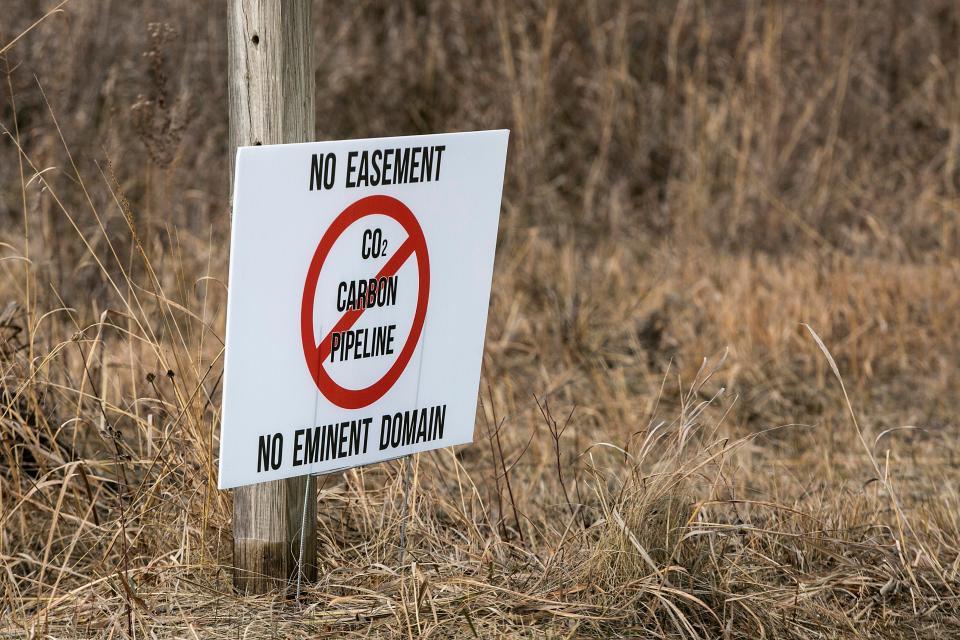Iowa pipeline regulators reject tribe's request for environmental impact study
Iowa regulators have declined a Winnebago tribal request that Summit Carbon Solutions conduct a state-level environmental impact study of its proposed $4.5 billion carbon-capture pipeline across Iowa.
The Iowa Utilities Board said Thursday that the Ames company will address its proposed pipeline's environmental impact in connection with its request for a permit to build the 680-mile project across 29 Iowa counties. The three-member board has not yet set a date for Summit's permit hearing.
"It will be necessary for Summit Carbon to file testimony and exhibits that address the environmental permits and authorizations it needs to construct the proposed pipeline," the board said in its order. It added that "other parties may file testimony and exhibits in response to the evidence presented by Summit Carbon" and cross-examine the witnesses on environmental issues.
Winnebago Tribe of Nebraska has land in Iowa

The Winnebago Tribe of Nebraska has a reservation in Dakota County, Nebraska, and Iowa's Woodbury County, straddling the Missouri River. It requested in June that the Iowa Utilities Board, the U.S. Army Corps of Engineers and the two counties, require Summit — as well as Navigator CO2 Ventures, which also wants to build a carbon capture pipeline — to conduct environmental impact studies.
Both of the proposed pipelines would cross or come close to Winnebago tribal land, as well as the Missouri River.
The filing that included the tribal council's resolution seeking the studies says the tribe "opposes the issuance of any permit that could negatively impact its lands or water or that of its neighbors."
The three-member utilities board said it would address the request for environmental studies by Navigator in a separate order. It was not available Friday.
"The Tribe opposes the issuance of any permit that could negatively impact its lands or water or that of its neighbors," according to the filing, which included the tribal council's resolution seeking the studies.
"As a permit issuing body, neither you nor the general public can make an informed decision without knowing the potential environmental impacts," the tribal council added. It also asked that "any and all other entities impacted bySummit Carbon’s and Navigator’s" proposed pipelines be required to have environmental studies conducted, as well.
Iowa Utilities board: no specific legal requirement for environmental study
Summit and Navigator, along with Wolf Carbon Solutions, propose capturing carbon dioxide emissions from ethanol and other industrial agriculture operations, liquefying them under pressure and pumping them through hundreds of miles of pipelines to locations — Summit's in North Dakota, Navigator and Wolf's in Illinois — where they can be sequestered deep underground.
The board, noting it has requested additional environmental information from Summit, said it made a similar decision in 2015, when opponents of the Dakota Access crude oil pipeline sought a state-level environmental impact study.
Regulators said then that there is no explicit legal requirement, in statute or in rules, for an independent environmental impact report as a part of the permit proceeding. About 350 miles of the Dakota Access pipeline runs through Iowa, bringing crude oil from the North Dakota Bakken region to a distribution hub near Patoka, Illinois.
More:Builders vow CO2 pipelines will be safe. Worried Iowans point to a Mississippi rupture.
The Iowa Chapter of the Sierra Club said in a filing supporting the Winnebago tribe's request that the utilities board has an "obligation to ensure protection of the environment in considering pipeline projects." The group added that the board instead "passes the buck to other agencies," such as the Iowa Department of Natural Resources, the U.S. Environmental Protection Agency and the U.S. Army Corps of Engineers, which then claim to have "limited jurisdiction."
Summit: Pipeline will 'meet or exceed' all state requirements
Summit said in its response to the tribe's request that the Corps is best suited to conduct an environmental impact study and that no additional state action is needed. Additionally, the company, a spinoff of Iowa ag mogul Bruce Rastetter's Summit Agricultural Group, will "meet or exceed all federal and state environmental laws and regulations."
Summit said it is "committed to the protection of the environment — indeed, one of the benefits of project is that it will have the ability to prevent the equivalent of 2.6 million cars worth of CO2 generated by industries critical to Iowa’s farm economy from reaching the atmosphere each year."
More:Acknowledging 'strong feelings on both sides,' Iowa corn association backs carbon capture pipelines
Pipeline supporters say the projects will enable ethanol and other energy-intensive agricultural industries to remain viable as the nation seeks to cut net greenhouse emissions in half by 2030 to address climate change. Iowa is the nation's leading producer of both ethanol and the corn used to manufacture it. About half the state's annual harvest goes to make the biofuel.
The projects have been controversial, garnering thousands of objections, many focused on the possible use of eminent domain to force unwilling landowners to sell access to their land for the pipelines' construction. Residents also have voiced concern about the pipelines' safety and the impact construction would have on farmland and underlying drainage systems.
Donnelle Eller covers agriculture, the environment and energy for the Register. Reach her at deller@registermedia.com or 515-284-8457.
This article originally appeared on Des Moines Register: Winnebago tribe request for pipeline environmental impact study denied

